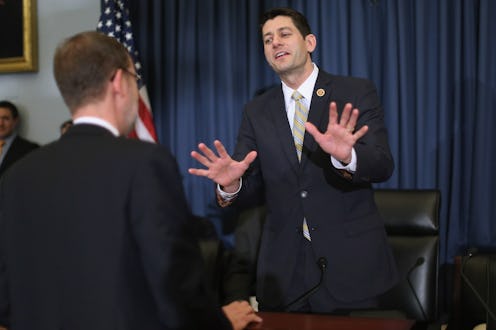News
Paul Ryan Wages War On 'War On Poverty'
When it comes to fighting poverty, we're doing it wrong. At least that's according Paul Ryan (R-Wis.), formerly of Romney and Ryan and current House Budget Committee Chairman. In an extensive report released Monday, Ryan criticizes federal poverty programs as "duplicative" and "counterproductive," and says they actually contribute to the high poverty rate by creating a "poverty trap." Unfortunately, several academics have pointed out that Ryan misappropriated their data — not to mention, Ryan accidentally discovered that a bunch of the programs work.
The report aims to analyze the effectiveness of American anti-poverty programs 50 years after President Lyndon B. Johnson declared the "War on Poverty." In the report, Ryan's report is a prelude to the House GOP budget, which will focus on welfare reform, and came just before President Barack Obama's budget was released Tuesday.
There are a good number of anti-poverty programs that Ryan's analysis found to be effective in helping millions of Americans. These include the Earned Income Tax Credit (EITC), which the report calls "an effective tool for encouraging and rewarding work among lower-income individuals, particularly single mothers," and the Veterans Health Administration, which the report concedes is “effective in providing access to inexpensive health care for low-income veterans.”
Among the programs Ryan finds particularly offensive is the Supplemental Nutrition Assistance Program, also known as food stamps, which over 47 million Americans rely on at a cost of $78 billion in 2012. SNAP, says Ryan, only has a "modest effect on poverty" and, what's more, it "discourages work among female-headed households" and married men.
Ryan's also not so keen on Medicaid, which he says "has little effect on patients' health," "increases the likelihood of receiving welfare benefits" and "increases use of the emergency room." Medicaid cost the government $265 billion in 2013. Still, he praises Homeless Assistance Grants, the School Breakfast Program, and the Elderly Nutrition Program, which the report says is "well targeted towards the low-income elderly and to those with increased risk for nutrition and health problems.”
Unsurprisingly, there are plenty who are pretty hacked off with Ryan's report. Not least among them are the economists who say Ryan misappropriated their research to prove his point. It seems Ryan has employed a trick used by politicians on both sides of the aisle to show that academic research and data supports their policies: The data he's using is technically correct, but it doesn't exactly tell the whole story.
For example, Brian Beutler at Salon points out that Ryan uses the Official Poverty Rate to chart the decline in poverty between 1965 and 2012. Using this measure, the rate has only decreased from 17.3 percent to 15 percent. However, the Official Poverty Rate does not take into account government transfers to low-income households, which Ryan credits in a footnote. Writes Beutler:
[It] reveals that his critique of federal anti-poverty programs is premised on a metric designed to create a false impression that tons of money has been wasted, when really it’s done exactly what it was supposed to.
The war on poverty has indeed been a bust if you treat the poor people it’s lifted above the federal poverty line as if they remain impoverished. But that’s like saying “The Earned Income Tax Credit has failed you because, if you don’t count the value of the tax credit, you’re still in poverty,” and then applying the same logic to millions of beneficiaries.
Oh, and the researchers who authored a study published in December by the Columbia Population Research Center are none too pleased either. See, when Ryan cited their study he carelessly chopped off two years of data, conveniently leaving out two of the most successful years of the war against poverty.
The study, which uses the Supplemental Poverty Measure — which takes into account government programs such as SNAP and EITC — shows that the poverty rate fell from 26 percent in 1967 to 15 percent in 2012. Ryan decided to lop off the first two years, which leaves out 36 percent of the decline.
“It’s technically correct, but it’s an odd way to cite the research,” one of the study's authors, Columbia University's Professor Jane Waldfogel, said in an interview with the Fiscal Times. “In my experience, usually you use all of the available data. There’s no justification given. It’s unfortunate because it really understates the progress we’ve made in reducing poverty.”
The GOP's budget is due to be unveiled later this month, so we'll all get to see what Ryan's master plan is for dealing with all of the inadequacies he highlights in his report.
